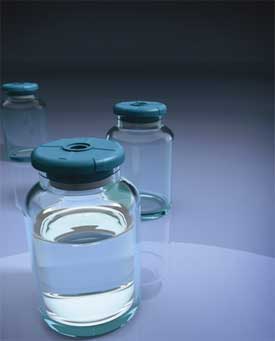Jun 6 2008
At MD&M East, booth #2430, GLS – recently acquired by PolyOne Corporation, and a global leader in the manufacture of high-performance, custom-formulated thermoplastic elastomers (TPEs) – is launching a portfolio of specialty VERSAFLEX™ TPEs engineered for dynamic-seal gaskets and static-seal stoppers for the healthcare industry. This unique product line is the first component of a complete, phthalate-free fluid delivery packaging platform that will leverage the enhanced performance, design flexibility, and systems cost benefits of TPEs vs. traditional thermoset elastomers. The GLS materials support regulatory and eco-initiatives by avoiding halogens, polynuclear aromatics (PNAs), nitrosamines, 2-MBT, and other controversial additives. In addition to providing a range of properties, the new TPE grades can be customized for specific customer requirements.
 GLS TPEs used in gaskets and stoppers.
GLS TPEs used in gaskets and stoppers.
“Patient safety heads the list of concerns in today’s healthcare market, and GLS TPEs for fluid delivery systems can help ensure this,” said Joe Kutka, technology launch manager, GLS. “In addition to exceptional cleanliness; low permeation, leachables and extractables; and formulation without potentially harmful additives, our new VERSAFLEX TPEs provide highly effective sealing performance to safeguard the integrity of medical fluids. They are also ideal for overmolding onto polyolefins to avoid points of failure from discrete components. As a superior alternative to traditional thermosets, these TPEs can help device manufacturers meet the increasingly stringent demands of today’s healthcare market.”
Device Designers Move Beyond Thermosets
GLS TPEs deliver solutions compared to the many drawbacks of thermoset rubbers. Because TPEs do not require curing, they avoid use of nitrosamines and other hazardous leachables, offering better compliance with environmental regulatory requirements. Further, producing thermosets requires three or four steps, each of which introduces the possibility of compromised quality. In contrast, injection molding TPEs is a one-step process. Another TPE advantage is greater design flexibility, including part consolidation, through techniques such as overmolding onto a variety of substrates, which cannot be done with conventional elastomers.
New Materials for Dynamic and Static Sealing
GLS’ TPE portfolio for gaskets and stoppers includes four VERSAFLEX grades, all of which can be customized for specific application requirements. The four new TPEs for gaskets and sealing meet the requirements of United States Pharmacopeia (USP) Class IV and International Organization of Standards (ISO) 10993, and comply with European Pharmacopeia and USP standards for extractables.
- Dynamic Sealing Materials – For gasketing applications such as drug storage seals, the new GLS TPEs provide excellent coefficient of friction (COF) to ensure even pressure with minimal or no “chatter” or stiction during fluid withdrawal. This helps ensure a consistent user experience and a high level of precision. Both dynamic sealing grades are available in black.
- VERSAFLEX HC 2110-57B: This grade, with a Shore A hardness of 57 and good compression set to avoid distortion from heat exposure, is ideal for single-use devices such as prefilled syringes that must be autoclaved prior to sale. The high sealing performance of this TPE preserves the integrity of the fluid even over extended contact with the gasket.
- VERSAFLEX HC 2110-54B: Offering low COF and no stiction, this TPE is appropriate for lower-cost disposable devices that do not require autoclaving.
- Static Sealing Material – For stoppers, GLS’ new VERSAFLEX grades for static sealing avoid the issue of coring – bits of material breaking off during needle insertion – that is typical of thermoset rubber. GLS has successfully tested the resealing performance of its VERSAFLEX HC 2110-43N grade with needles as large as 16 gauge. Both static sealing grades are autoclavable and are available in natural color.
- VERSAFLEX HC 2132-51N: For vacuum-sealed containers, this material provides excellent oxygen and moisture barrier properties approaching those of butyl rubber, but allows overmolding for design flexibility. Applications include blood collection and pharmaceutical containers.
- VERSAFLEX HC 2110-43N: This grade offers excellent reseal performance and good compression set for stoppers for fluid delivery devices such as IV bottles and medical vials
The new GLS VERSAFLEX TPE portfolio for healthcare is available worldwide.